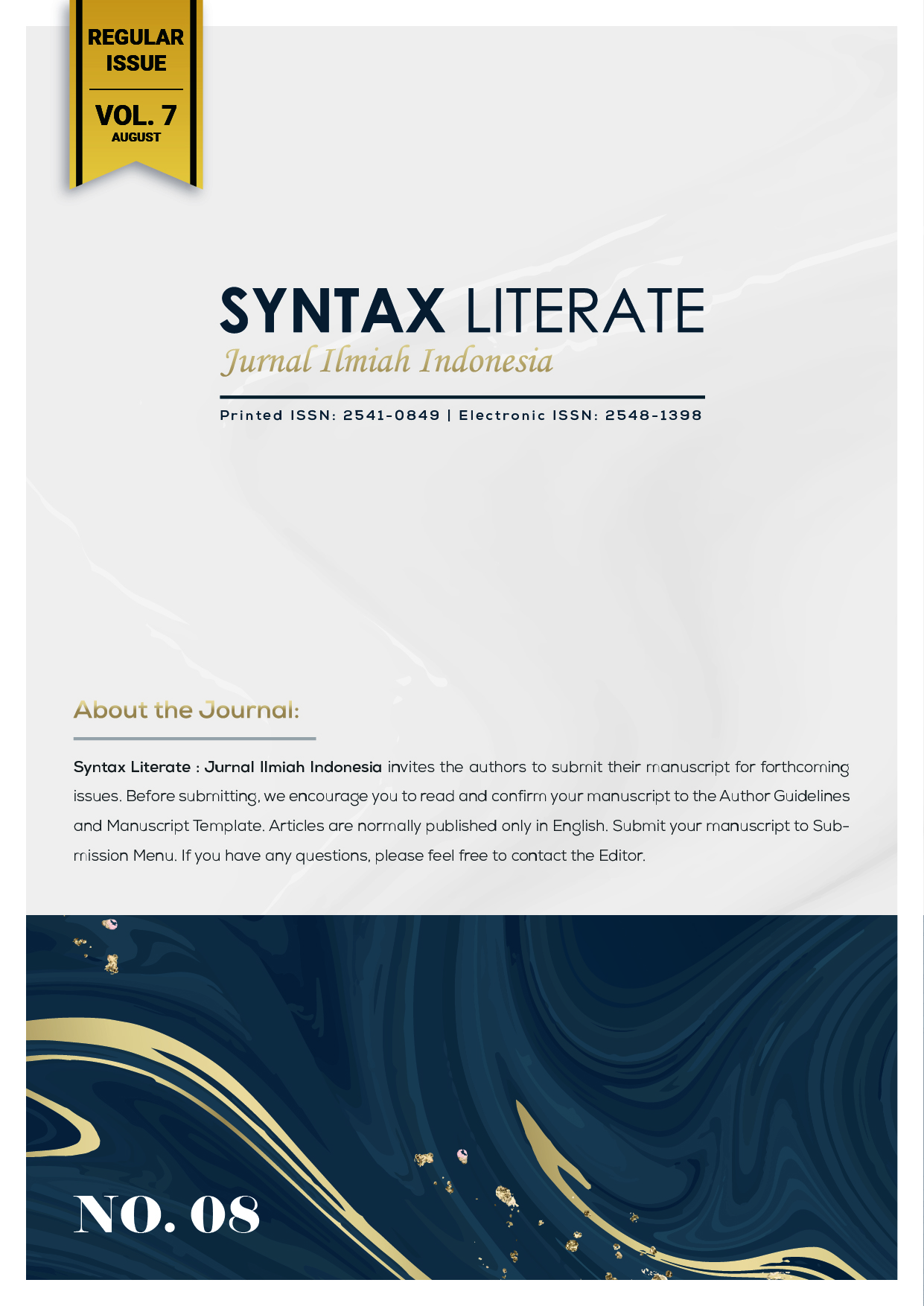Practicing Patriarchy in Islam: Are there Equality and Justice in The Role and Position in Islam?
Abstract
This research aims to analyze the role and position of women in Islam with the argument that there is a distinct practice of patriarchy in Islam. Therefore, this research searches for the principles of equality and justice that may be contained in the Al-Quran and Hadith, as well as some examples of the life of the Prophet Muhammad and the practice of the early period of Islam showing women's active participation in various aspects of life. This research shows the findings that support the perspective of Islamic teachings which are in line with the principles of gender equality. The method used in this study is through literature study accumulating from some previous research to explain how religious texts, such as the Qur'an and Hadith are interpreted to shape gender dynamics in Islamic societies, and the factors that influence patriarchal manifestations in Islamic societies. The article shows that this essay contends that it is important to socialize the universalist values found in Islamic holy scriptures that support justice, respect women's rights, and work toward achieving equality between different genders that can be implemented in Muslim societies. The dissemination of this gender-sensitive interpretation of Islamic literature should aim to raise public knowledge of issues relating to women's rights and gender equality in Islam.
Downloads
References
Ahmed, Lelia. (1992). Women and gender in Islam: Modern roots of a historical debate. Yale University Press.
Ali, K. (2016). On Critique and Careful Reading. Journal of Feminist Studies in Religion, 32(2), 121–126.
Al-Mizzi. Tahdhib al-Kamal (Juz 19, page 268). Dar al-Ma'rifah.
Al-Quran, Surah Al-Zumar (39:9) https://www.islamicfinder.org/
Al-Qurtubi 13 M https://islamqa.info/id / https://www.islamweb.net/en/
Al-Tabari. Tarikh al-Tabari (Juz 9, page 120). Dar al-Kutub al-'Ilmiyyah.
Badran, M. (2009). Feminism in Islam: secular and religious convergences. One World. Oxford.
Barlas, A. (2002). "Believing Women" in Islam: Unreading Patriarchal Interpretations of the Qur'an. University of Texas Press.
Basarudin, A. (2015). Humanizing the sacred: Sisters in Islam and the struggle for gender justice in Malaysia. University of Washington Press.
Bukhari, Muhammad. Sahih al-Bukhari. Translated by Muhsin Khan. https://islamqa.info/id / https://www.islamweb.net/en/
Eka, K. D. (2015). Panduan Penyusunan Studi Literatur. Lembaga Penelitian Dan Pengabdian Masyarakat Poltekes. Mojokerto.
Esposito, John L. (2017). Islam: The Straight Path. Oxford University Press, 2017.
Farwaneh, S. (1993). The Veil and the Male Elite: A Feminist Interpretation of Women’s Rights in Islam: Fatima Mernissi. Digest of Middle East Studies, 2(4), 71–74. doi:10.1111/j.1949-3606.1993.tb01017.x
Fath al-Bari by Ibnu Hajar al-Asqalani 15 M.
Hadits Riwayat Ahmad. https://islamqa.info/id / https://www.islamweb.net/en/
Hafiz Ibn Kathir Tahun: 1373 M https://islamqa.info/id / https://www.islamweb.net/en/
Ibn Abdilbarr. (n.d.). Al-Isti'ab (Juz 2, halaman 510). Dar al-Kutub al-'Ilmiyyah.
Ibn Saad. Tabaqat Ibn Saad (Juz 8, halaman 310). Dar al-Kutub al-'Ilmiyyah.
Ibnu Hajar al-Asqalani. (n.d.). Al-Isabah fi Tamyiz al-Sahabah (Juz 3, page 175). Dar al-Kutub al-'Ilmiyyah.
Ibnu Katsir. (2000). Tafsir Ibn Kathir (Juz 3, page 213). Dar al-Fikr.
Ibnu Katsir. Al-Bidayah wa al-Nihayah (Juz 5, page 130). Dar al-Fikr.
Imam Ahmad bin Hanbal 9 M https://islamqa.info/id / https://www.islamweb.net/en/
Imam al-Bukhari 9 M https://islamqa.info/id / https://www.islamweb.net/en/
Imam Ibn Majah 9 M https://islamqa.info/id / https://www.islamweb.net/en/
Jalaluddin al-Mahalli dan Jalaluddin as-Suyuti https://islamqa.info/id / https://www.islamweb.net/en/
Kitab Tafsir al-Tabari, karya Abu Jafar Muhammad bin Jarir at-Tabari https://islamqa.info/id / https://www.islamweb.net/en/
Larsen, L., Mir-Hosseini, Z., Moe, C., & Vogt, K. (2013). Gender and equality in Muslim family law: Justice and ethics in the Islamic legal tradition. Bloomsbury Publishing.
Mashhour, A. (2005). Islamic law and gender equality: Could there be a common ground?: A study of divorce and polygamy in Sharia Law and contemporary legislation in Tunisia and Egypt. Human Rights Quarterly, 562–596.
McGinty, A. M. (2007). Formation of alternative femininities through Islam: Feminist approaches among Muslim converts in Sweden. Women’s Studies International Forum, 30(6), 474–485.
Mernissi, F. (1996). Women’s rebellion & Islamic memory.
Mir-Hosseini, Z. (2006). Muslim women’s quest for equality: Between Islamic law and feminism. Critical Inquiry, 32(4), 629–645.
Mir-Hosseini, Z. (2013). How to Challenge Patriarchal Ethics of Muslim Legal Tradition. Open Democracy.
Mir-Hosseini, Z. (2018a). Justice and Equality and Muslim Family Laws: New Ideas, New Prospects. Sharia and Justice: An Ethical, Legal, Political, and Cross-Cultural Approach, 73.
Mir-Hosseini, Z. (2018b). Women’s equality. The Shari’a: History, Ethics and Law. IB Tauris.
Mir-Hosseini, Z. (2019). Islamic law and the question of gender equality. In Routledge Handbook of Islamic Law (pp. 340–354). Routledge.
Mir-Hosseini, Z., Al-Sharmani, M., & Rumminger, J. (2014). Men in charge?: rethinking authority in Muslim legal tradition. Simon and Schuster.
Mirâ€Hosseini, Z. (2011). Beyond ‘Islam’vs ‘feminism.’ IDS Bulletin, 42(1), 67–77.
Moghadam, V. M. (2005). Globalizing women: Transnational feminist networks. JHU Press.
Mojab, S. (2001). Theorizing the politics of ‘Islamic feminism.’ Feminist Review, 69(1), 124–146.
Muhammad ibn Jarir al-Tabari Tahun: Abad ke-10 M https://islamqa.info/id / https://www.islamweb.net/en/
Özkazanç-Pan, B. (2015). Secular and Islamic feminist entrepreneurship in Turkey. International Journal of Gender and Entrepreneurship, 7(1), 45–65.
Sahih al-Bukhari 2658 https://sunnah.com/bukhari:2658
Sahih Muslim - https://islamqa.info/id / https://www.islamweb.net/en/
Sunan Abu Dawud - https://islamqa.info/id / https://www.islamweb.net/en/Sunan Ibn Majah - Kitab Hadits yang dikumpulkan oleh Imam Ibn Majah
Syed, J., & Van Buren, H. J. (2014). Global business norms and Islamic views of women’s employment. Business Ethics Quarterly, 24(2), 251–276.
Tafsir al-Jalalayn (791 H/1389 M) https://islamqa.info/id https://www.islamweb.net/en/ https://www.islamicfinder.org/
Tafsir al-Qurtubi (671 H/1272 M) https://islamqa.info/id https://www.islamweb.net/en/ https://www.islamicfinder.org/
Tafsir Ibn Kathir (774 H/1372 M) https://islamqa.info/id https://www.islamweb.net/en/ https://www.islamicfinder.org/
Tuhfatul Ahwadzi by al-Mubarakfuri 19 M https://islamqa.info/id https://www.islamweb.net/en/ https://www.islamicfinder.org/
Wadud-Muhsin, A. (2006). Inside the gender jihad: women’s reform in Islam. (No Title).
World Health Organization. "Understanding and Addressing Violence Against Women." Diakses pada September 2021. https://www.who.int/news-room/fact-sheets/detail/violence-against-women.
Copyright (c) 2022 Ega Nur Fadillah, Erni Heriyanti, Nur Saebah

This work is licensed under a Creative Commons Attribution-ShareAlike 4.0 International License.











